27 aug 2020
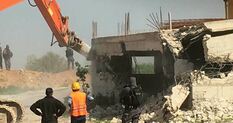
The Israeli occupation army on Thursday morning demolished a bakery under construction and delivered a demolition notice against a carpenter shop in Arraba town, southwest of Jenin, at the pretext of unlicensed construction.
According to local sources, an Israeli bulldozer escorted by soldiers knocked down a bakery under construction at the Arraba junction.
The building belonged to a local resident called Mustafa Hammad.
The Israeli army also notified a citizen of its intent to demolish his carpenter shop in the town.
According to local sources, an Israeli bulldozer escorted by soldiers knocked down a bakery under construction at the Arraba junction.
The building belonged to a local resident called Mustafa Hammad.
The Israeli army also notified a citizen of its intent to demolish his carpenter shop in the town.
23 aug 2020
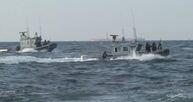
The Israeli occupation navy on Sunday attacked Palestinian fishermen and their boats during their presence within less than one nautical mile off the western shore of Gaza port.
Coordinator of the fishermen’s union in Gaza Zakariya Bakr said that Israeli gunboats escalated their aggression recently against fishing boats and launched attacks on them within less than one nautical mile after they used to attack them within three nautical miles.
Bakr said the Israeli closure of Gaza sea, which continued for the seventh consecutive day, deprives Gaza fishermen of their daily sustenance and increases their families' suffering.
Before the current tension in Gaza, the Israeli navy was also attacking and harassing fishermen almost on a daily basis, with no reason.
Under the 1993 Oslo accords, Palestinian fishermen are permitted to fish up to 20 nautical miles off the coast of Gaza, but since then Israel has kept reducing the fishing area gradually to a limit between six to three nautical miles.
Coordinator of the fishermen’s union in Gaza Zakariya Bakr said that Israeli gunboats escalated their aggression recently against fishing boats and launched attacks on them within less than one nautical mile after they used to attack them within three nautical miles.
Bakr said the Israeli closure of Gaza sea, which continued for the seventh consecutive day, deprives Gaza fishermen of their daily sustenance and increases their families' suffering.
Before the current tension in Gaza, the Israeli navy was also attacking and harassing fishermen almost on a daily basis, with no reason.
Under the 1993 Oslo accords, Palestinian fishermen are permitted to fish up to 20 nautical miles off the coast of Gaza, but since then Israel has kept reducing the fishing area gradually to a limit between six to three nautical miles.

The Israeli occupation forces (IOF) on Sunday morning tightened the noose on Palestinian workmen as they were heading for workplaces in Israel through several crossings in the West Bank province of al-Khalil and attacked many of them with tear gas.
According to local sources, the IOF detained dozens of West Bank workers near the Dhahiriya crossing in southern al-Khalil.
The IOF also intensified its presence at openings in the separation fence in al-Khalil, which are used by workers to reach their workplaces.
Many workers were also showered by the IOF with tear gas canisters near the Tarqumiyah crossing in western al-Khalil.
According to local sources, the IOF detained dozens of West Bank workers near the Dhahiriya crossing in southern al-Khalil.
The IOF also intensified its presence at openings in the separation fence in al-Khalil, which are used by workers to reach their workplaces.
Many workers were also showered by the IOF with tear gas canisters near the Tarqumiyah crossing in western al-Khalil.
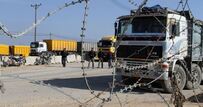
A Palestinian official said that the Israeli occupation authority (IOA) decided on Sunday to ban entry of all kinds of goods into Gaza through al-Karama border crossing, except for food and medical supplies.
The official told Anadolu news agency that the private sector companies were informed of the Israeli decision in this regard.
For more than a week, the IOA have been preventing entry of building materials and fuel supplies into Gaza and imposing closure on its sea.
The official told Anadolu news agency that the private sector companies were informed of the Israeli decision in this regard.
For more than a week, the IOA have been preventing entry of building materials and fuel supplies into Gaza and imposing closure on its sea.
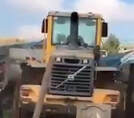
The Israeli occupation authority (IOA) on Sunday morning demolished storehouses in Issawiya district, northeast of the Old City of Jerusalem.
According to local sources, the structures belonged to Mohamed Muheisen and were demolished at the pretext of unlicensed construction. video
Palestinians in east Jerusalem are forced to build without permits due to the Israeli municipality’s refusal to grant them building permits or approve zoning plans for their areas.
Issawiya is one of many Palestinian areas in east Jerusalem that are facing home demolitions and displacement campaigns as part of Israel’s Judaization activities in the holy city.
According to local sources, the structures belonged to Mohamed Muheisen and were demolished at the pretext of unlicensed construction. video
Palestinians in east Jerusalem are forced to build without permits due to the Israeli municipality’s refusal to grant them building permits or approve zoning plans for their areas.
Issawiya is one of many Palestinian areas in east Jerusalem that are facing home demolitions and displacement campaigns as part of Israel’s Judaization activities in the holy city.
22 aug 2020
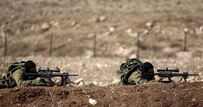
The Israeli occupation forces (IOF) on Saturday morning opened machinegun fire towards swaths of cultivated land and shepherds in the besieged Gaza Strip.
According to local media sources, Israeli soldiers opened fire at a group of shepherds in the east of al-Bureij refugee camp in central Gaza and forced them to leave the area.
An agricultural area in the east of al-Qarara town in the east of Khan Yunis, south of Gaza, also came under similar gunfire attack.
Luckily, no one was hurt in the shooting attacks.
According to local media sources, Israeli soldiers opened fire at a group of shepherds in the east of al-Bureij refugee camp in central Gaza and forced them to leave the area.
An agricultural area in the east of al-Qarara town in the east of Khan Yunis, south of Gaza, also came under similar gunfire attack.
Luckily, no one was hurt in the shooting attacks.
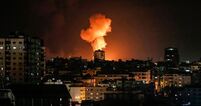
The Israeli army shelled sites in the besieged Gaza Strip, early Saturday, and its navy opened fire at fishermen’s boats on the Gaza coast, Palestinian WAFA News Agency reported.
WAFA correspondent said Israeli tanks fired two shells at a site east of Khuzaa town, east of Khan Younis in the southern Gaza Strip, causing damage and fire, but no human casualties.
Three more artillery shells were fired at a location east of Rafah city, in the south, destroying the site.
Meanwhile, the Israeli navy opened fire at Palestinian fishing boats at the pier in the northern Gaza Strip, damaging some, WAFA correspondent added.
Israel has escalated the already dire situation for the two million Palestinian civilians in Gaza by closing the fishing zone, blocking fishermen a means to make a living.
Furthermore, Israeli authorities closed the only commercial crossing between Israel and the Gaza Strip, stopping fuel to run the sole power plant in the Strip.
The Israeli army continues to claim that its intense bombardment and shelling of Gaza have been in retaliation for fires set to southern Israeli fields by the incendiary balloons launched from Gaza, as an act of resistance.
Israel’s practice of collective punishment is seen across the occupied territories, from the 13 year long blockade to the bombing of the Gaza Strip, from home demolitions to arbitrary arrests in the West Bank.
“Collective punishment is an inflamed scar that runs across the entire 53-year-old Israeli occupation of Palestine. Over these years, two million Palestinians in Gaza have endured a comprehensive air, sea and land blockade since 2007, several thousand Palestinian homes have been punitively demolished, extended curfews have paralyzed entire towns andregions, the bodies of dead Palestinians have been withheld from their families, and critical civilian supplies – including food, water and utilities – have been denied at various times. Notwithstanding numerous resolutions, reports and reminders critical of its use, Israel continues to rely upon collective punishment as a prominent instrument in its coercive toolbox of population control.” – Michael Lynk [pdf], United Nations Special Rapporteur on the situation of human rights in the occupied Palestinian territories/Human Rights Council/Forty-fourth session, 15 June–3 July 2020
WAFA correspondent said Israeli tanks fired two shells at a site east of Khuzaa town, east of Khan Younis in the southern Gaza Strip, causing damage and fire, but no human casualties.
Three more artillery shells were fired at a location east of Rafah city, in the south, destroying the site.
Meanwhile, the Israeli navy opened fire at Palestinian fishing boats at the pier in the northern Gaza Strip, damaging some, WAFA correspondent added.
Israel has escalated the already dire situation for the two million Palestinian civilians in Gaza by closing the fishing zone, blocking fishermen a means to make a living.
Furthermore, Israeli authorities closed the only commercial crossing between Israel and the Gaza Strip, stopping fuel to run the sole power plant in the Strip.
The Israeli army continues to claim that its intense bombardment and shelling of Gaza have been in retaliation for fires set to southern Israeli fields by the incendiary balloons launched from Gaza, as an act of resistance.
Israel’s practice of collective punishment is seen across the occupied territories, from the 13 year long blockade to the bombing of the Gaza Strip, from home demolitions to arbitrary arrests in the West Bank.
“Collective punishment is an inflamed scar that runs across the entire 53-year-old Israeli occupation of Palestine. Over these years, two million Palestinians in Gaza have endured a comprehensive air, sea and land blockade since 2007, several thousand Palestinian homes have been punitively demolished, extended curfews have paralyzed entire towns andregions, the bodies of dead Palestinians have been withheld from their families, and critical civilian supplies – including food, water and utilities – have been denied at various times. Notwithstanding numerous resolutions, reports and reminders critical of its use, Israel continues to rely upon collective punishment as a prominent instrument in its coercive toolbox of population control.” – Michael Lynk [pdf], United Nations Special Rapporteur on the situation of human rights in the occupied Palestinian territories/Human Rights Council/Forty-fourth session, 15 June–3 July 2020
|
|
A horde of extremist Jewish settlers on Saturday morning assaulted Palestinian shepherds and wreaked havoc on an olive grove in Masafer Yatta town, south of al-Khalil in the occupied West Bank.
According to local sources, settlers from illegal settlements near Masafer Yatta attacked several shepherds in a grazing area and forced them to leave the area. The settlers also stormed an olive grove and destroyed hundreds of olive trees in Tumen area. The grove belongs to a local resident called Barakat Mur. |
In Nablus, a group of settlers placed on the same day a prefabricated house on a swath of Palestinian land in Yanun village.
Page: 36 - 35 - 34 - 33 - 32 - 31 - 30 - 29 - 28 - 27 - 26 - 25 - 24 - 23 - 22 - 21 - 20 - 19 - 18 - 17 - 16
